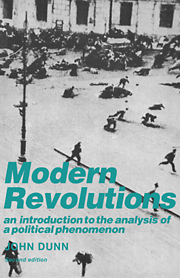Book contents
- Frontmatter
- Contents
- Preface to the first edition
- Introduction to the second edition
- Introduction: the ideological dilemmas of moden revolution and its analysts
- 1 Russia
- 2 Mexico
- 3 China
- 4 Yugoslavia
- 5 Vietnam
- 6 Algeria
- 7 Turkey
- 8 Cuba
- Conclusion: approaches to the ideological assessment and causal explanation of modern revolutions
- Notes
- Bibliography: guide to further reading
- Supplementary reading, 1971–88
- Index
Introduction: the ideological dilemmas of moden revolution and its analysts
Published online by Cambridge University Press: 05 June 2012
- Frontmatter
- Contents
- Preface to the first edition
- Introduction to the second edition
- Introduction: the ideological dilemmas of moden revolution and its analysts
- 1 Russia
- 2 Mexico
- 3 China
- 4 Yugoslavia
- 5 Vietnam
- 6 Algeria
- 7 Turkey
- 8 Cuba
- Conclusion: approaches to the ideological assessment and causal explanation of modern revolutions
- Notes
- Bibliography: guide to further reading
- Supplementary reading, 1971–88
- Index
Summary
Revolution is not a frivolous subject and revolutions are peculiarly unfrivolous events. What causes them to happen and what they mean are questions .which cannot readily be separated from one another. They are also intensely political questions, questions at issue – today, at least – in every persisting order of power relations of any geographical scale and in every effort made to subvert such an order. The central issue which they raise is in the last resort rather a simple one – do human social conditions have to be as unequal and as unjust as everywhere they now are? But the answer which they give so far, if not obviously very encouraging, is also not a very clear one. But because the question which they raise is so profound, if in some respects so inscrutable, revolution is not a topic about which it is either possible or proper to be neutral. This is not to say that in considering revolutions an analyst is properly liberated from the constraints of natural scientific criteria of truth or falsehood, let alone from more quotidian standards of veracity. Generous emotions may be unequivocally admirable in personal human encounters but in the study of revolution they have no privileged place. Responsibility to the truth is and must be absolute. Highly selective presentations of the meaning of revolution are commonplace and most of the general propositions which could be advanced about revolution in the effort to explain its occurrence are too tendentious to be true.
- Type
- Chapter
- Information
- Modern RevolutionsAn Introduction to the Analysis of a Political Phenomenon, pp. 1 - 23Publisher: Cambridge University PressPrint publication year: 1989



